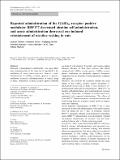| dc.contributor.author | Vlachou, Styliani | |
| dc.contributor.author | Guery, Sebastien | |
| dc.contributor.author | Froestl, Wolfgang | |
| dc.contributor.author | Banerjee, Deboshri | |
| dc.contributor.author | Benedict, Jessica | |
| dc.contributor.author | Finn, M. G. | |
| dc.contributor.author | Markou, Athina | |
| dc.date.accessioned | 2013-01-30T21:57:56Z | |
| dc.date.issued | 2011 | |
| dc.identifier.citation | Vlachou, Styliani, Sebastien Guery, Wolfgang Froestl, Deboshri Banerjee, Jessica Benedict, M. G. Finn, and Athina Markou. 2011. Repeated administration of the GABA\(_B\) receptor positive modulator BHF177 decreased nicotine self-administration, and acute administration decreased cue-induced reinstatement of nicotine seeking in rats. Psychopharmacology 215(1): 117-128. | en_US |
| dc.identifier.issn | 0033-3158 | en_US |
| dc.identifier.uri | http://nrs.harvard.edu/urn-3:HUL.InstRepos:10251522 | |
| dc.description.abstract | Abstract: Rationale \(\gamma\)-Aminobutyric acid (GABA) is the major inhibitory neurotransmitter in the brain and is implicated in the modulation of central reward processes. Acute or chronic administration of GABA\(_B\) receptor agonists or positive modulators decreased self-administration of various drugs of abuse. Furthermore, GABA\(_B\) receptor agonists inhibited cue-induced reinstatement of nicotine- and cocaine-seeking behavior. Because of their fewer adverse side effects compared with GABA\(_B\) receptor agonists, GABA\(_B\) receptor positive modulators are potentially improved therapeutic compounds for the treatment of drug dependence compared with agonists. Objectives and methods: We examined whether the acute effects of the GABA\(_B\) receptor positive modulator N-[(1R,2R,4S)-bicyclo[2.2.1]hept-2-yl]-2-methyl-5-[4-(trifluoromethyl)phenyl]-4-pyrimidinamine (BHF177) on nicotine self- administration and food-maintained responding under a fixed-ratio 5 schedule of reinforcement were maintained after repeated administration. The effects of acute BHF177 administration on cue-induced nicotine- and food-seeking behavior, a putative animal model of relapse, were also examined. Results: Repeated administration of BHF177 for 14 days decreased nicotine self-administration, with small tolerance observed during the last 7 days of treatment, whereas BHF177 minimally affected food-maintained responding. Acute BHF177 administration dose-dependently blocked cue-induced reinstatement of nicotine-, but not food-, seeking behavior after a 10-day extinction period. Conclusions: These results showed that BHF177 selectively blocked nicotine self-administration and prevented cueinduced reinstatement of nicotine seeking, with minimal effects on responding for food and no effect on cue-induced reinstatement of food seeking. Thus, GABA\(_B\) receptor positive modulators could be useful therapeutics for the treatment of different aspects of nicotine dependence by facilitating smoking cessation by decreasing nicotine intake and preventing relapse to smoking in humans. | en_US |
| dc.language.iso | en_US | en_US |
| dc.publisher | Springer-Verlag | en_US |
| dc.relation.isversionof | doi:10.1007/s00213-010-2119-x | en_US |
| dc.relation.hasversion | http://www.ncbi.nlm.nih.gov/pmc/articles/PMC3072487/pdf/ | en_US |
| dash.license | LAA | |
| dc.subject | relapse prevention | en_US |
| dc.subject | smoking cessation | en_US |
| dc.subject | addictive drugs | en_US |
| dc.subject | nicotine dependence | en_US |
| dc.subject | treatment | en_US |
| dc.subject | medication | en_US |
| dc.title | Repeated Administration of the GABA\(_B\) Receptor Positive Modulator BHF177 Decreased Nicotine Self-Administration, and Acute Administration Decreased Cue-Induced Reinstatement of Nicotine Seeking in Rats | en_US |
| dc.type | Journal Article | en_US |
| dc.description.version | Version of Record | en_US |
| dc.relation.journal | Psychopharmacology | en_US |
| dash.depositing.author | Banerjee, Deboshri | |
| dc.date.available | 2013-01-30T21:57:56Z | |
| dash.affiliation.other | 100178 | en_US |
| dc.identifier.doi | 10.1007/s00213-010-2119-x | * |
| dash.contributor.affiliated | Banerjee, Deboshri | |


